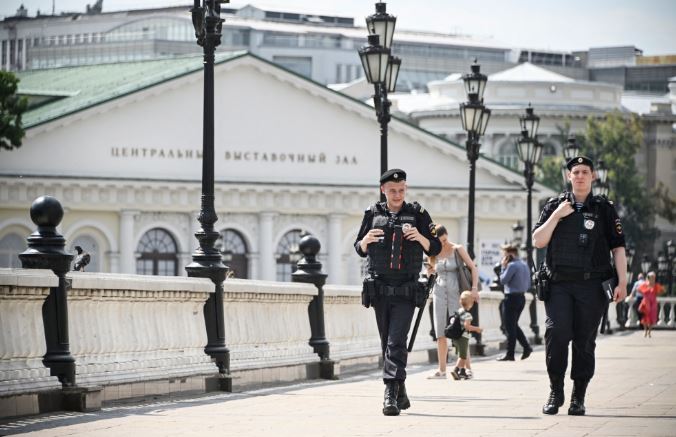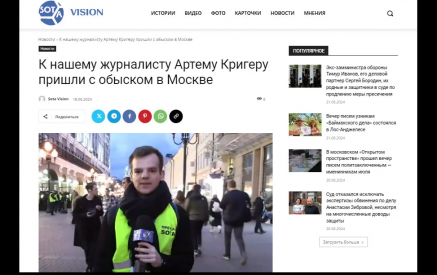Paris, August 23, 2022—Russian authorities should immediately release journalists and media workers recently arrested on extortion and fraud charges and ensure that the country’s judicial system is not used to silence critical voices, the Committee to Protect Journalists said Tuesday.
Between August 1, and August 16, Russian authorities raided the homes of and detained at least eight journalists and media workers in connection with alleged extortion and fraud, according to news reports.
At least seven journalists and Telegram media workers remained in detention as of Tuesday, August 23. Telegram has become a platform widely used in Russia and Ukraine by independent media outlets to broadcast news as news websites and social media have been subjected to massive blocking since the war began,according to news reports. Pro-Russian operators also use Telegram to distribute propaganda and disinformation.
“The press freedom situation in Russia has only become more alarming since the country’s full-scale invasion of Ukraine in February. Russian authorities are increasingly charging journalists with financial crimes in apparent retaliation for their investigation into business and political issues,” said Carlos Martinez de la Serna, CPJ’s program director, in New York. “The Russian judicial system must not be used to silence critical voices, and authorities must immediately release all the journalists and media workers who remain in custody and drop all charges against them.”
Read also
Denis Shaikin
On August 1, a court in the western city of Kursk sentenced Denis Shaikin, the publisher of local newspaper Kursk Week, to two years in prison and a fine of 100,000 rubles (US$1,661) in damages on extortion charges, according to media reports.
Shaikin was accused of asking for 400,000 rubles (US$6,646) from the director of a local enterprise in exchange for not publishing an article about the takeover of a rival company, those reports said.
In a document published on social media, Shaikin denied the charges and said he would be on a hunger strike “until (his) full exoneration and release.”
CPJ emailed Kursk Weekfor comment and information about his health but did not receive any reply. The case against Shaikin was opened in September 2020, according to media reports.
“This is a standard practice in Russia—if a journalist has had conflicts with a business or enterprise, he is sent to prison on ‘extortion’ charges,” Ekaterina Sergeycheva, chief editor of news outlet Lenizdat, which reported on Shaikin’s case, told CPJ via messaging app.
Vladimir Panfilov and Artem Prokhorov
On August 4, a court in the western city of Oryol ordered the detention of Artem Prokhorov, who runs the local news website Orlets, and Vladimir Panfilov, host of news program “Resume,” which Panfilov created and produced on YouTube, until September 29 and October 1, respectively, on charges of extortion, according to media reports.
If found guilty, they face up to seven years in prison, according to the Russian criminal code.
Authorities accused the journalists of extorting 100,000 rubles (US$1,661) from a local businessman in exchange for not publishing allegedly compromising information about him, according to those reports. Panfilov and Prokhorov both denied the charges and appealed their arrest, those reports said.
CPJ is investigating to determine whether Prokhorov’s and Panfilov’s charges are linked to their journalistic work. CPJ emailed Orlets, but did not receive any reply.
Vladislav Malushenko, Yevgeny Moskvin, and Aleksei Slobodenyuk
Also on August 4, the Basmanny court in Moscow ordered the detention until September 25, of Vladislav Malushenko, Yevgeny Moskvin, and Aleksei Slobodenyuk, media workers who run the Telegram channel Scanner on charges of large-scale fraud, according to multiple media reports. If found guilty, they face up to six years in prison, according to the Russian criminal code.
Authorities accused the trio of extorting money from Rostec, a state-owned defense conglomerate, in exchange for not publishing negative data about it, those reports said.
According to reports, Malushenko works for the Federal News Agency and Moskvin and Slobodenyuk work for the Narodnye Novosti publishing house, both workplaces reportedly linked to Russian oligarch Yevgeny Prigozhin.
The Scanner channel, which has about 178,000 subscribers and claims to “monitor corrupt government officials,” published allegations about corruption at jailed opposition leader Alexei Navalny’s Anti-Corruption Foundation, and the channel “is used to discredit those who disagree with the government,” according to investigative outlet Agentstvo.
Aleksandra Bayazitova
On August 8, police detained Aleksandra Bayazitova, a freelance journalist with pro-government news site Life. Bayazitova also runs the Telegram channel Adskiye Babki, which has about 37,000 subscribers and reports on economic and corruption issues, on extortion charges, and seized her equipment, according to multiple media reports. On August 10, the Kuzminsky court in Moscow ordered her detained until October 7. Bayazitova has diabetes and received medication while jailed, those reports said. If found guilty, she faces up to 15 years in jail, according to the criminal code.
Authorities claimed that Bayazitova extorted money from Promsvyazbank, a state-owned Russian bank, in exchange for not publishing negative information about it, those reports said.
During her trial, Bayazitova denied the charges, and claimed she was prosecuted for publishing evidence that Promsvyazbank executives were involved in embezzlement and stole federal money allocated to Russia’s defense industry, which she said led to Russia’s current “bad situation in Ukraine.”
(On the same day, the Kuzminsky court ordered Inna Churilova and Olga Arkharova, two administrators of non-media business Telegram channels, detained until Oct. 7 on extortion charges, those reports said.)
Lev Speransky
On August 16, police in Moscow detained Lev Speransky, an investigative journalist with privately-owned daily newspaper Moskovsky Komsomolets and brought him for questioning at the Interior Ministry’s Main Directorate for the Moscow region, according to his outlet, which published a video of the journalist and multiple media reports. He was released later in the evening, according to news reports.
Moskovsky Komsomolets reported that Speransky did not show up for work on that day and could not be reached by phone. In a video published by Moskovsky Komsomolets, Speransky’s wife Maria said that a group of about six people entered their apartment and only two of them showed police credentials.
In the video posted by his outlet and filmed before he was taken for questioning, Speransky said that the police searched his home, forcibly seized his computer and telephone, and “put physical and psychological pressure on him.”
Speransky said in the video that he was detained in relation to a defamation and extortion case opened in 2018 that he had no connection with.
Authorities made Speransky a witness in this case, those reports said. In the video, Speransky states he believes his detention to be linked to his journalistic activity. In another video published by the Telegram channel Baza, Speransky said he was “currently working on stories that might not please some people.”
CPJ contacted Speransky via messaging app but did not receive any reply.
Media reported that investigators questioned him exclusively about his links to anonymous Telegram channel VChK-OGPU, which has more than 438,000 subscribers and regularly reports on the Russian security services, according to CPJ’s review of the channel. Speransky denied any connection to that channel, those reports said.
Speransky has reported on multiple high-profile cases, such as the poisoning of Sergei and Yulia Skripal and the 2019 Federal Security Service (FSB) headquarters shooting in Moscow, his outlet and media reported.
“Is there a practice of prosecuting journalists under the guise of extortion cases? Certainly, yes,” Aleksei Obukhov, editor of the independent news outlet SOTA, told CPJ via messaging app. “Nevertheless, the ‘extortion’ charge is applied less frequently than blatantly political articles and is related not to repressions against society as a whole, but, rather, to personal conflicts of specific government and business representatives with certain journalists,” he added.
CPJ emailed the Russian Interior Ministry for comment but did not receive any reply.
Committee to Protect Journalists





























































